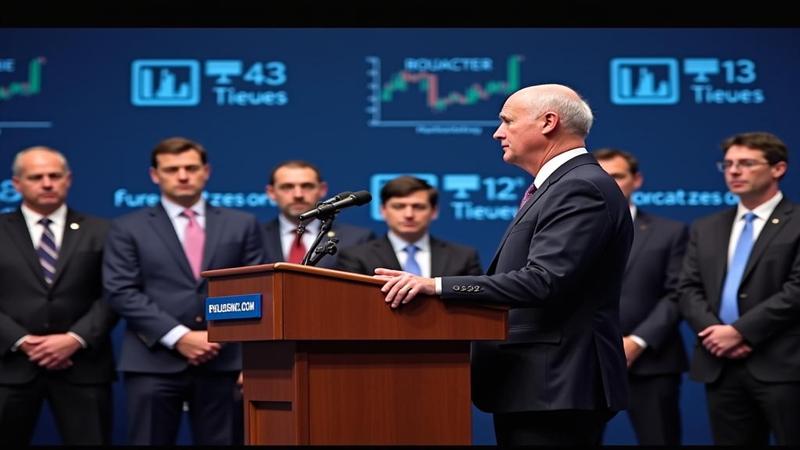Powell's Friday Speech: Three Scenarios That Could Shake, Then Snack the Markets

Powell’s Friday speech is poised to send markets on a rollercoaster, with investors clutching their risk dashboards like lifeboats. The anticipation is less about ink on a page and more about the tremor in bond yields that follows every polite pause.
Three scenarios are whispered like urban legends in CNBC parking lots: a hawkish twist that squeezes risk assets, a dovish retreat that pleases float-loving traders, or a plain vanilla performance that leaves everyone arguing about whether the mic was on.
The chair could signal rate hikes or a steady stance, or he could improvise a soliloquy about the weather while the stock market hums along. Whatever he says, financiers will pretend to understand; the rest will pretend to care.
Markets are playing a game of ‘guess the dot plot,’ with volatility as the referee. If Powell smiles, the numbers rejoice; if he frowns, the yield curve gets existential.
Analysts will dissect every syllable, every pause, every sly eyebrow raise. Traders will chase decimals as if they were the last pizza slice at a conference.
The speech isn’t only about interest rates; it’s about confidence, credibility, and whether the coffee machine in the room works.
Audiences will parse the phrase ‘data dependent’ like a secret password. The word ‘neutral’ could become a tax code; ‘save’ could become a budget line item.
In a world where rhetoric meets risk, even the Fed can’t help but feel the urge to upgrade their personal gear, perhaps a pair of ‘best noise-cancelling headphones’ to block the echo chamber. The room will be full of clocks, but no one will know if time is really moving.
Billions will watch from couches and trading floors alike, clutching smartphones as if they were lucky charms. The pundits will sprint to their keyboards to declare victory no matter what is said.
If Powell leans hawkish, markets will price higher for longer and the calendar will resemble a sudoku of rate paths. If he leans dovish, relief rallies will flood into risk assets, and economists will start arguing about whether relief rhymes with relief.
Contenders on TV will frame the preview as the Fed’s grand finale, while the actual script remains under lock and key. Investors will listen for hints, but mostly they’ll listen for the next crisis to snack on.

Observers will judge the tone, the stance, and whether the chair swivels on a snazzy ‘ergonomic desk chair’ during the briefing.
Politicians will claim victory whichever path unfolds, using talking points more polished than a ceremonial sword.
Even if the word count is low, the market will read into every comma as if it were a data release. A stifled yawn from the chair could be labeled as restraint.
Fed communication this cycle resembles a glossary of buzzwords: ‘forward guidance,’ ‘policy normalization,’ and the infamous ‘data dependent’ refrain.
Inflation stubbornly refuses to disappear, and wage data keeps rewriting the chorus. The chair’s sentences will be measured as if they were a sugar-free dessert.
Other factors, like global growth and supply chain quirks, will shadow the speech as if they walked in wearing roller skates. The audience will pretend to map the policy path with a compass that occasionally points to coffee.
If the speech falters, the emoji market will spike, and the index funds will pretend to be emotionally invested. The newsroom will report that volatility ‘took a breath’ and kept going.
International markets will watch the U.S. weather and adjust their forecasts like meteorologists with a bias toward optimism.
Friday’s address may be more about theater than doctrine, with a chorus of analysts debating every eyebrow raise. The only certainty is that someone will declare victory before the curtain falls.
Some observers will celebrate the quiet, others will complain that the speech was too polite to generate real drama. The rest will go back to their spreadsheets and pretend the future is a stable plot.
Stay tuned, because the five-second rule of Wall Street is real: whatever Powell says, the market will decide what it meant before the sentence ends.
